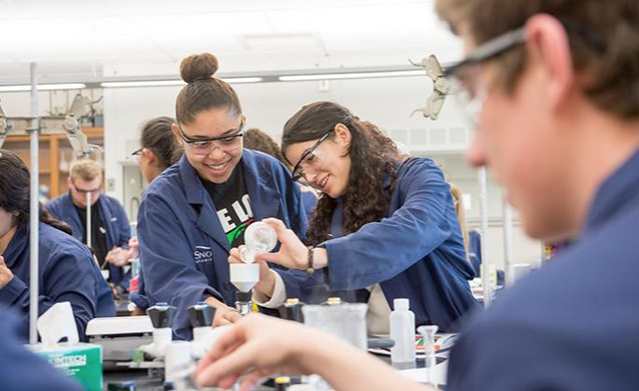This week, the Department of Education gave out scholarships to Hispanic Serving Institution (HSI)-certified colleges and universities with the intention of helping Latinx students pursue STEM majors that might otherwise be inaccessible. Hispanic Serving Institutions are universities and colleges with over 25% Latinx students in their student body. While Sonoma State is an HSI-certified university, it was not one of the 12 institutions awarded the grant, but another HSI in Sonoma County was.
The Santa Rosa Junior College (SRJC) was awarded the HSI STEM grant on Oct.13 for their proposal to provide more “pathways” to STEM majors that would be more accessible to Latinx students, low-income, and first generation students. The grant will award SRJC $4.69 million over a period of five years per their announcement.
In the abstract of their grant award, SRJC is “to address the challenges faced by Hispanic, low-income, and first generation students while strengthening the infrastructure of the college to serve future generations of students.” The proposal goes on to address the “roadblocks” faced exclusively by Latinx, low-income, and first generation and how the funds will be used to provide pathways to success.
For this proposal they partnered with a number of local universities and colleges in which the funds provided to help new STEM majors would allow them to transfer to universities for further education. These universities and colleges included: Humboldt State University, Pacific Union College, and Sonoma State University.
Their partnership with Sonoma State and other institutions is to “create articulation and transfer pathways for new STEM degrees” as quoted from the SRJC’s announcement of the grant. However, Sonoma State did not release any news of this grant, nor was there a response for an information request to the administration.
Sonoma State was the latest CSU to be certified as an HSI. In 2017 Sonoma State became the 21st accredited HSI. That same year, SSU received a grant that was designated for the foundation of the PUERTA program, which is designed to prepare more Hispanic and Latinx students for the path to become future teachers.
Nataly Hernandez, the Senator for Diversity at Sonoma State, and a first generation Latinx student herself, acknowledges that financial strain of attending university. It is a big part of why what would be first generation pioneering Latinx students don’t make it to university.
“Adding the grant to the Latinx, first generation, and low income students in STEM majors at SSU would improve diversity in that a lot of students don’t attend college because of the cost,” Hernandez said.
The STEM majors inaccessibility for many students is a primary reason that it lacks diversity, as Hernandez addressed, saying, “The STEM major is also extremely expensive, which may be the reason why the STEM majors hold a huge disparity in diversity, because other students may have a better background or living situation to be able to afford college. This can increase diversity by being a relief for students who fear attending college because of financial stressors, bringing in a wide variety of students, not just from the Latinx communities.”
This financial stress was only made worse by the COVID-19 pandemic causing already declining enrollment rates to drop further.
“The university is going through a period of low enrollment because of COVID. The only and best way to diversity and grow those numbers is by being of assistance to the students that don’t attend college because of lack of resources/financial support,” Hernandez added.
While the SRJC’s pathways for STEM major transfer students will go a long way to providing more accessibility and diversity in Sonoma State, the university itself will have to make a plan to reach more Latinx, low income, and first generation students. On this Hernandez said “Of course there are more methods to diversify the student body. Not just through grants, SSU is currently working a lot on outreach.” Outreach and funding to on-campus organizations like CAASE, Center for Academic Access and Student Enrichment, which provides aid to low income and first generation students are ways Sonoma State is getting involved in aid to marginalized students and hopefully moving towards an even more inclusive future.




































